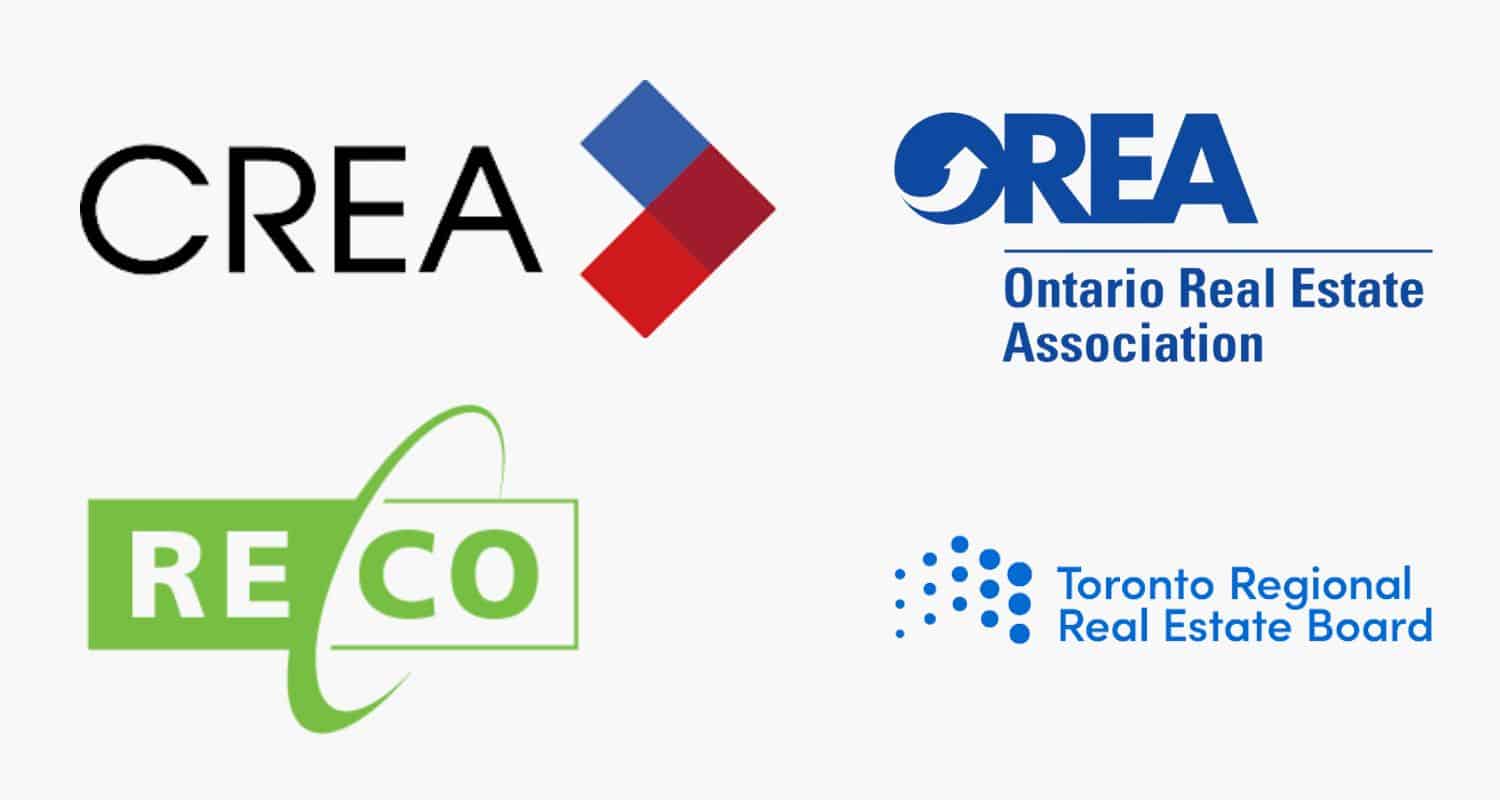Real estate is a regulated and organized profession, but who does what? This is what we’re going to clarify. Let’s start with the Real Estate Council of Ontario or Reco. Reco was established in 1997 as a delegated administrative authority. Reco administers the real estate and business brokers Act 2002 and regulates the trade of real estate on behalf of the Ontario government.
Reco’s mission is excellence in the delivery of regulatory services that protect the public interest and enhance consumer confidence in the real estate profession to trade in real estate. In Ontario real estate brokerages, brokers, and salespersons must be registered with Reco, but some legislative exceptions apply.
RECO regulates the activity of trade in real estate in the public interest. Protecting the public interest is achieved through enforcing the standards required to obtain and maintain registration as a brokerage, broker, or salesperson, and delivering the duties of the registrar. Establishing minimum requirements for pre-registration and continuing education, conducting routine inspections of brokerage offices to ensure compliance with REBBA 2002, and educate brokers of record addressing inquiries, concerns.

And complaints about the conduct of registrants received from all sources and taking appropriate action to protect the public interest. Establishing and administering insurance requirements, which include consumer deposit, protection, promoting ongoing education, and competent, knowledgeable, and professional service.
Reco also administers the code of ethics, one of the regulations in REBBA 2000 and. And like all regulations, it is one to which all registrants must adhere. The code sets out the conduct expected of brokerages, brokers, and salespersons. The code covers areas such as confidentiality, written representation agreements, financial disclosure, and advertising.
Reco protects consumer interests by investigating complaints and concerns related to the conduct of brokerages, brokers and salespersons. Reco investigates all complaints and then determines whether disciplinary action is warranted. The extent of the discipline will depend on the nature of the complaint.
Reco further protects consumer. As well as registrants through its insurance program, all registrants must participate in Reco’s insurance program, which consists of the three insurance coverages, errors and emissions insurance, commission protection insurance, and consumer deposit insurance. The consumer deposit insurance is free to the consumer.
Registrants pay the insurance premiums with this insurance deposits on real estate. Transactions with registered real estate brokers and salespersons are protected in the event of insolvency fraud or misappropriation of funds. Reco’s Mandatory Continuing education program is a great benefit to the profession.
This program is designed to foster professional development and help registrants provide consumers with current and accurate advice. The continuing education program requires registrants to maintain their knowledge and skills by completing mandatory education requirements in each two year registration cycle.
In addition, the RECO website and Reco news letter. For the record, provide registrants with current and relevant information and news. Each of us must take a course on relevant regulatory issues governing our profession in accordance with the act. Reco regularly inspects the offices of Brokerages as part of its routine operations.
In addition to encouraging compliance with regulatory requirements, the inspection process enables Reco to educate brokerages about proper record keeping. These visits typically involve inspection of trade record sheets, accounting records, and the handling of trust monies. Reco also performs a courtesy inspection of a new brokerage upon request to ensure that current and appropriate records are being kept from the start of operation.
Again, what is the role of Reco to administer the Real Estate and Business Brokers Act 2002, regulate the trade of real estate on behalf of the Ontario government, enforce the standards required to obtain and maintain registration as a brokerage, broker, or salesperson. If you’d like to learn more about Reco, go to the Reco website www.Reco.on.ca.
Now that you have a better understanding of Reco’s role in the real estate profession, let’s look at some of the areas where misunderstandings often occur. You’ve probably heard terms such as organized real estate, realtor and non-real. You may be confused by their meaning, so let’s examine them more closely.
Starting with organized real estate, most professions form associations to represent the interests of their members in our profession. This is called organized real estate, and it has three levels. Local, provincial and national
at the local level are the real estate boards, brokers, and salespersons who choose to join a real estate board, become members of organized real estate, and may call themselves realtors. The Ontario Real Estate Association known as OREA, represents realtor interests at the provincial level. The Canadian Real Estate Association known as CREA, represents the interests of all realtors in Canada.
Thanks to a three-way agreement, when you join a real estate board, you automatically become a member of OREA and CREA. It is important to understand that membership in organized real estate is optional. You don’t need to join a board to trade in real estate. Being a Reco registrar is what enables you to trade real estate in Ontario.
In fact, there are thousands of registrants who operate quite successfully without joining organized real estate. Again.
How is real estate organized in Ontario?
Three levels, local, provincial, and national.
Real estate boards represent interests of realtors at the local level For Example TRREB Toronto Regional Real Estate Board
OREA represents realtor interests at the provincial level.
CREA represents the interests of all realtors in Canada.
So now that you know what organized real estate is, Let’s look at each of the three levels and some of the services they provide to realtors. Real estate boards work hard to ensure their members professional knowledge and skills are up to date by delivering education seminars and workshops. These courses provide invaluable knowledge and skills for use on the job.
Advocacy is another key service boards provide. Large or small. All boards ensure that the needs of the profession are first and foremost in the minds of municipal politicians and town counselors. The Ontario Real Estate Association is the Provincial Association. OREA represents more than 82,000 brokers and salespersons who are members of the province’s 40 real estate boards.
OREA’s mission is help Ontario realtors, brokerages and associations. OREA serves its members through a variety of public. Special services and educational programs. OREA also delivers all real estate registration courses in Ontario through the OREA Real Estate College on behalf of RECO through a designate agreement between the college and Reco.
To ensure that the courses are available to as wide an audience as possible, the college delivers them in three formats, classroom correspondence and e-learning. The classroom provides a stimulating and interactive learning environment for those who work well on their own Correspondence, either textbook or CD ROM provides maximum flexibility and control over.
For those who are comfortable with technology, taking courses online via E-Learning offers flexibility and the ability to learn from any location with internet access.
The Canadian Real Estate Association provides Canadian realtors with a number of services and products. The three most important are a voice in federal government listing access to Canada’s largest public real estate database, realtor.ca, and self populating standard forums, web forums. CREA owns the MLS trademark and has a proprietary interest in the realtor.
These trademarks can only be used in Canada by realtors who adhere to a strict code of ethics. CREA implements a realtor code of ethics in standards of business practice, by which all realtors must agree to abide. And CREA runs a national advertising campaign designed to promote the value of using a realtor to consumers.
In closing, we hope you now have a better appreciation for how real estate is structured in Ontario, and a better understanding of who the players are and the roles they play.
Who Regulates real estate agents in Ontario?
In the province of Ontario, real estate is monitored and regulated by the Real Estate Council of Ontario (RECO); in other words, RECO takes responsibility for overseeing transactions conducted within this domain on behalf of the government. As such, all salespersons and brokers must be registered with this organization as a requisite to conducting business. (Source)
Can you report a real estate agent in Ontario?
At RECO, we take grievances from both consumers and real estate professionals extremely seriously. Our impartial complaints process is designed to provide a thorough investigation of any concerns raised, regardless of whether there has been an infringement on the law or Code of Ethics. You can rest assured that you don’t need to pre-judge your complaint as this assessment will be handled fairly by our experienced team. (Source)
If you’re selling a house in Ontario, for how long are you legally responsible?
Until the transaction is finalized and you take ownership of the property, it is the seller’s duty to maintain its condition. Thus, any damage incurred or items omitted from a sale prior to your acquisition are their sole responsibility. Once your purchase funds have been transferred and possession handed over however, all liability transfers onto you as new owner. (Source)
Is there a way for sellers in Ontario to withdraw from an existing real estate transaction?
Is it possible for a seller to back out of an agreement by declining to close? Absolutely not. If this occurs, the buyer has every right to seek legal action against the seller.
What RECO stands for?
RECO is a not-for-profit corporation that is delegated by the provincial government to administer and enforce the Real Estate and Business Brokers Act, 2002 (REBBA 2002) and associated regulations. (Source)
How much does it cost to become a real estate agent in Ontario?
You should budget approximately $7,500 to cover the costs of becoming a licensed real estate agent in Ontario. This includes:
-
- Tuition fees for mandatory real estate courses and exams (typically $2,000-$3,000)
- Application, registration, and exam fees payable to RECO ($430)
- Annual professional liability insurance ($500)
- Local real estate board membership dues ($1,500 – $2,500)
- Additional expenses like books, supplies, marketing costs, etc. ($500-$1,000)
The major costs are the pre-licensing education and local board fees. Overall, $7,500 is a reasonable estimate to become a registered real estate agent able to provide services in Ontario after completing RECO requirements. Individual costs can vary based on specific courses and board memberships.
Becoming a real estate agent in Ontario: Costs, Duration, and Differences
If you’re aiming to work in real estate in Ontario, you’ll need a RECO license. Being licensed ensures that you’re recognized and can legally operate in the profession. Reference
The journey to becoming a licensed real estate agent in Ontario involves courses and an exam, which typically takes about a year. Reference
Once you’re an agent, your income would primarily come from commissions. On average, a real estate agent in Canada earns around $106,062, with commissions usually being about 6% of the property’s sale price. Reference
Lastly, while both terms “realtor” and “real estate agent” are used in residential real estate, there’s a distinction. A realtor is a member of a specific association and can be an agent or a broker. In contrast, an agent helps people buy and sell homes, while brokers have more training and can oversee other agents. Reference
For more information, visit the following websites.
https://www.orea.com/
https://www.reco.on.ca/
https://www.crea.ca/

